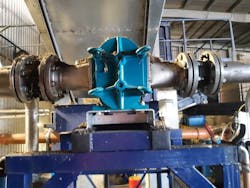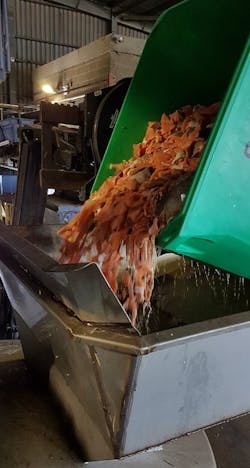About the author:
Chris French is a freelance writer on water, environment and renewable energy issues. French can be reached at [email protected].
A rotary lobe chopper pump is playing a key role in the continuing success of an award-winning waste-to-energy operation in the Outer Hebrides, Scotland.
At Stornoway’s Creed Integrated Waste Management Facility (IWMF) on the Isle of Lewis, the Borger Multicrusher chops a 7-cubic-ton batch per shift of coarse waste salmon. This has enabled the facility to integrate the fish with household food waste and garden waste for its anaerobic digestion (AD) and biogas process.
Guaranteeing the shred of waste salmon to meet BSI PAS 110 regulations and EU ABP regulation 1774/2002 [5a] for the safe use of digestate as a renewable fertiliser is crucial, and the rotary lobe chopper pump cuts the waste to the required maximum particle size of 12 mm.
This pump has helped Comhairle nan Eilean Siar (the Local Authority for the Western Isles), together with its partners, The Scottish Salmon Co., Pure Energy Centre PEC and Community Energy Scotland, win the Scottish Environment Business VIBES award.
“Borger’s Multicrusher works extremely well for us in a very harsh environment,” said Donnie Macmillan, plant manager at the Creed facility. “Some salmon waste can be quite tough and abrasive, so understandably we see wear on the cutters during our inspections, but that’s perfectly understandable.
“Importantly, the Borger unit helps us meet all of our PAS 110 requirements, which is all part of what we set out to achieve here—optimizing the methods of managing waste—in this case not sending waste salmon to landfill sites, and not having to have it transported off the island”.
Based on the rotary lobe design, the twin-shaft pump homogenizes the waste salmon to facilitate the pumping and pasteurization process and ensures downstream equipment can operate smoothly. By inserting individual blade disks and defining the direction of rotation of the shafts, operators have the flexibility to choose which way the pumped medium flows. Various blade widths and cutting profiles determine the final cutting yield.
“We are very proud to play our part at Creed,” said David Brown, Borger U.K. managing director. “It rightly deserves all the praise it gets for showing what can be done to protect the environment and reduce carbon footprint with good practice, forward-thinking and hard work.”
Managing waste from the island’s population of approximately 22,000, the Creed IWMF has grown to include a combined heat and power plant (CHP), electric boiler and thermal store, a wind turbine and a hydrogen system comprising electrolyzer, storage and refueling station and a 960 cubic meter AD and biogas plant.
Some electricity generated by CHP produces hydrogen and oxygen. This is captured, compressed and delivered to the salmon hatchery for essential oxygenation processes. A small fuel cell uses the hydrogen for electricity at the remote site, which sometimes suffers from electrical failures. The hydrogen system also includes a refueling station, where some of the hydrogen is used to refill a dual-fuel Refuse Collection Vehicle (RCV).
About the Author
Chris French
Chris French is a freelance writer on water, environment and renewable energy issues. French can be reached at [email protected].


